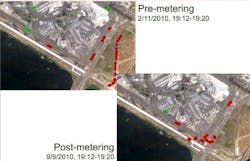MIT, PASSUR Study Shows Significant Benefits of Surface Departure Metering
The proprietary program combines software, process management, and a manned operations center staffed by a PASSUR professional services team—resulting in a "virtual departure queue." In the queue, flights are held at the gate or in a common metering area, rather than being queuing in an extended line with engines on, to “meter” the departures. When aircraft enter the active taxiway, they are ready to depart quickly, in a shorter taxi queue with less fuel burn, says an MIT research engineer. "Virtual queuing" helps to preserve a flight's position in the departure line-up and its planned runway departure time, regardless of whether the aircraft is physically on the active taxiway.
PASSUR personnel assisted with the provision of data and guidance on the analytical methodology and results interpretation based on PASSUR's design, implementation, and operation of the departure metering program at JFK.
Conducting the study were researchers from MIT Lincoln Laboratory and MIT's Department of Aeronautics and Astronautics, who are undertaking benefits assessment of surface congestion management systems at several U.S. airports. These activities support MIT Lincoln Laboratory’s development of a Tower Flight Data Manager (TFDM) system prototype, intended to help meet the FAA's Next Generation Air Transportation System (NextGen) objectives.
The JFK study proved to be complementary to MIT's field demonstrations of a departure metering concept at Boston Logan airport. These studies are part of a broader set of gate-to-gate operational mitigation areas under exploration, including advanced departure, cruise, and approach operations.
A technical paper revealing the detailed results of the study will be published at the American Institute of Aeronautics and Astronautics (AIAA) Aviation Technology, Integration, and Operations Conference in Virginia Beach in September.


